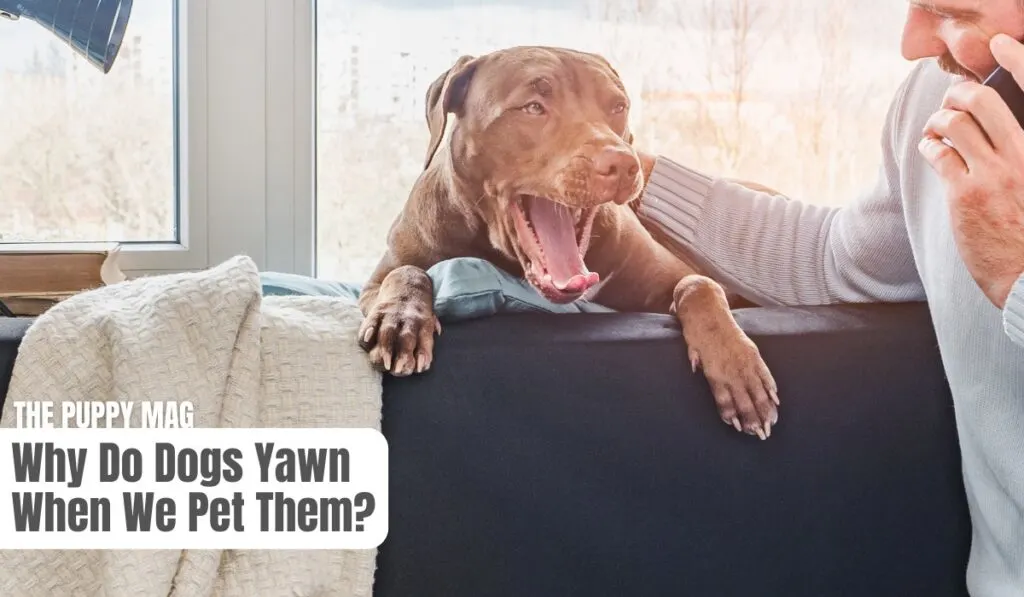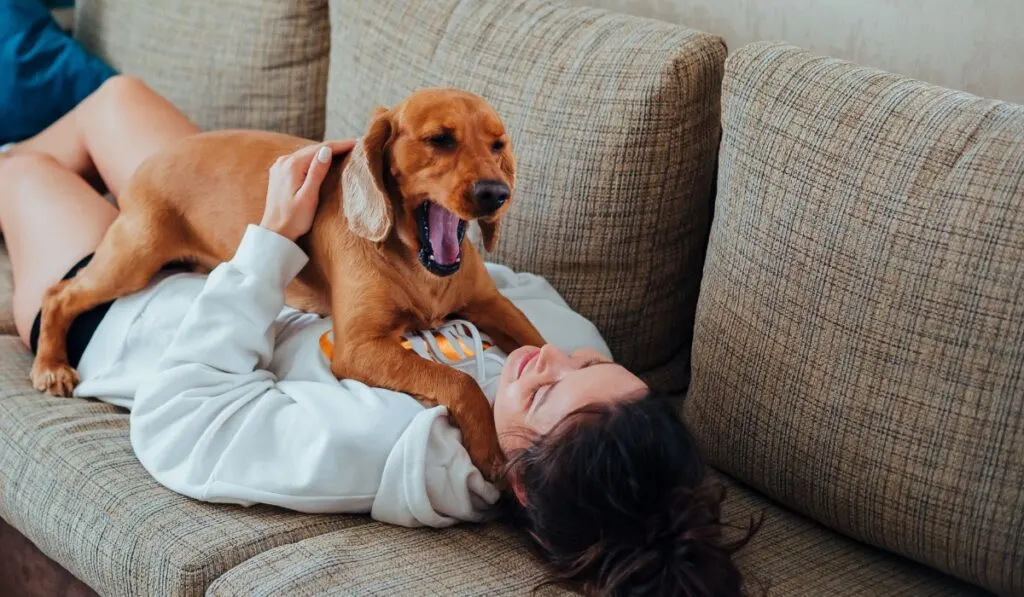Ever wondered why your furry friend seems to yawn so much when you’re showing them affection?
Whether it’s petting, cuddling, or even kissing, isn’t it weird for your dog to yawn as a reaction? There’s more to it thank you think
Let’s dive into the details and explore some possible reasons why your dog yawns when you pet them, and what it might mean.

Is Yawning & Petting Related?
Contrary to what we might initially think, a dog yawning when you pet them doesn’t necessarily mean they’re tired.
Instead, it can be a form of communication. Just like in humans, yawning can have different meanings depending on the context.
So yes, in certain situations, yawning and petting can be related.
While a yawn is a part of the dog’s calming signals, it can also be a subtle sign of stress or anxiety, particularly if the dog yawns more frequently or more intensely than usual.
To fully understand why a dog yawns when petted, it’s essential to look at the wider behavior and body language of the dog.
Takeaway: In most cases, when your dog yawns in response to you petting or cuddling them, it’s likely down to them feeling calm, excited, stressed, or unsure about something.
7 Reasons Why Your Dog Yawns When You Pet Them
There are a few reasons why a dog might yawn when you pet them. Whether it’s petting or cuddling, these same reasons apply.
1. Calming Signal
One of the primary reasons dogs yawn is to calm themselves down.
This behavior is often noticed when they’re being petted as petting generally makes them feel relaxed and secure. This is particularly true if your petting is gentle and soothing.
Additionally, a study in Tokyo revealed that dogs are more likely to yawn as a reaction to someone they’re emotionally bonded with.
This study even concluded that this is the more likely reason, over being stressed or anxious (as we’ll explain below).
2. Stress or Anxiety
Surprisingly, dogs can also yawn when they’re feeling stressed or anxious.
While petting usually helps dogs feel more relaxed, if they’re uncomfortable with the type or intensity of the petting, or if they’re in an unfamiliar environment, it could potentially cause them to feel stressed.
Petting should be a relaxing experience, and if it isn’t, it might be time to reassess the way you’re interacting with your dog.
3. Attention-Seeking Behavior
Some dogs may yawn as an attention-seeking behavior. If they’ve learned that yawning gets a reaction out of you, they may do it more often.
This is a classic example of dogs training their humans!
4. Anticipation or Excitement
Just as humans might yawn in anticipation of something exciting, dogs can do the same.
If you’ve just come home from work and your dog is excitedly awaiting your affection, they might yawn as part of this excitement.

5. Displacement Behavior
A displacement behavior is a normal behavior displayed out of context.
Yawning is a common displacement behavior in dogs, and it can occur when they are conflicted or uncertain about something.
If you pet your dog in a way they’re not entirely comfortable with, they might yawn as a displacement behavior.
6. A Sign of Submissiveness
Yawning can sometimes be a sign that a dog is feeling submissive.
While petting is generally an enjoyable experience for dogs, some may feel a bit submissive, particularly if they’re in a new environment or around new people.
7. Medical Reasons
Lastly, if your dog is yawning excessively, it might be a good idea to consult with a vet.
Excessive yawning can sometimes be a sign of a medical issue, such as a decrease in oxygen or a problem with the heart.
Although it’s rare, it’s always a good idea to rule out any potential medical issues. Consult with a trusted vet, like the professionals at VCA Hospitals, if you notice any unusual behavior or excessive yawning in your dog.
Why Your Dog Yawns When You Kiss Them
Dogs don’t naturally understand human displays of affection like hugging or kissing.
Therefore, if your dog yawns when you kiss them, it might be a calming signal to help them manage the unfamiliarity of the situation.
It’s their way of saying, “I’m not sure what’s happening, but It’s not a threat.”
Similarly, a dog might yawn during a kiss to signal discomfort.
It’s a polite way for your dog to express that they might prefer other forms of affection.
Respecting your dog’s boundaries is crucial, and if your dog seems uncomfortable with kisses, it might be best to stick to petting or playing as a way to show your love.
Is Yawning Linked To Affection?
While there’s still much to learn about dog behavior, yawning can indeed be linked to affection.
Interesting findings: A study mentioned on the ASPCA website explains how dogs are more likely to yawn in response to their owners yawning than when strangers do the same.
This contagious yawning suggests a connection with empathy, which is closely tied to affection.
However, it’s important to remember that this is not the only interpretation of a dog’s yawn.
As we’ve already seen, yawning can also indicate stress or anxiety, so context and accompanying body language are key when interpreting what your dog’s yawn might mean.
Does This Indicate Your Dog Is Happy & Comfortable?
A dog yawning when petted can be a sign of comfort and happiness.
However, it’s not the only indicator, and it’s best to look at your dog’s overall body language.
A relaxed posture, a wagging tail, and an overall calm demeanor generally indicate a happy and comfortable dog.
If you see these signs along with yawning when you pet your dog, it’s likely a sign of contentment.
If, however, your dog displays signs of anxiety or stress, like flattened ears or a tucked tail, the yawning might be a stress signal.
Last thoughts
Takeaway: In most cases, when your dog yawns in response to you petting or cuddling them, it’s likely down to them feeling calm, excited, stressed, or unsure about something.
Petting-induced yawning is quite normal and is usually a sign that your dog is relaxed and comfortable.
However, it’s essential to read the overall behavior of your dog and adjust your petting or kissing accordingly to ensure they’re comfortable and happy.
If you’re ever unsure about your dog’s behavior, reaching out to a professional vet or animal behaviorist is always a good idea.
